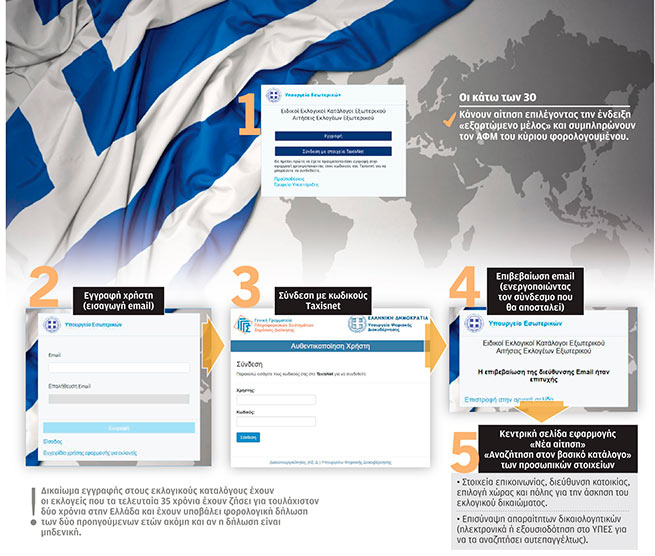What are the conditions for voters and what official documents are needed to complete the process – details on how to register on “apodimoi.gov.gr”.
In the upcoming national elections, Greeks living abroad will be able to vote at their place of residence for the first time. The procedure for registering on the respective electoral lists is relatively simple, but it concerns a limited number of Greeks abroad, and not all expatriates, due to the criteria established both by the legislation and by the decisions on its implementation. According to the law (4648/2019) adopted in December 2019, voters who have lived in Greece for at least two years in the last 35 years and who have filed an E1 or E2 or E3 or E9 tax return for both previous years, even if the return is nil, have the right to be registered in the voter lists. To prove that a person has lived in Greece for two years in the last 35 years, certain government documents are required as proof:
- Certificate of completion of elementary, secondary, technical or vocational school, or higher education.
- Proof of payment of national insurance premiums (stamps).
- Confirmation of military service for the entire period of military service.
However, Greeks living or studying abroad and under the age of 30 may register on the relevant voter lists without filing a tax return, provided that a first-degree relative filed a tax return in the current or previous tax year.
In order to be able to register, the voter must log into the application “apodimoi.gov.gr“.
The legislation provides that electoral rolls for Greeks abroad “closed” twelve days before the announced election.
For those who wish to register, it is important to know that they must do so immediately.
The law provides that the electoral rolls for Greeks abroad close twelve days before the day on which the elections are scheduled. Since the announcement of elections can be made at any time, it is desirable that this process be completed.
In order to be able to use the application, the voter must first register as a user and fill in the email address by which he/she will receive a response to the submitted application.
By selecting “register”, the user is now in the AADE environment and must enter their Taxinet login codes, then give their consent for the app to access their data (as is the case with all gov.gr apps) from their register. User data is filled in automatically, they are provided by AADE (for this you need to be registered in this system).
The user will then have to verify their registered email address by activating the link provided in the email sent to them. The email address for each user must be unique for a particular application, i.e. should not be used by two people.
When the user is on the main page of the application, an icon appears to the left of the panel at the top, which, with a single click, displays the available functions. With the button “Νέα Αίτηση” the user can start creating a new application. The user must click on the “Αναζήτηση στον βασικό κατάλογο” button located in the upper right corner of the screen to find their information in the primary election directory (similar to “Find out where to vote” (“Μάθε πού ψηφίζεις”)). Finding your personal number in the register and selecting it from the main list of voters is a prerequisite for registration and filing an application for registration. Two registrations can be found, in which case the user must select the correct one. If the data in the registry is not found, he/she cannot proceed with the application.
Persons under the age of 30 must apply by selecting the designation “dependent” (dependent), and also fill out AFM(TIN) of the main taxpayer. The user then fills in their contact details and home address, followed by the country and city where they want to exercise their voting rights. At the same time, the user must attach the required documents electronically or authorize the Ministry of the Interior to search for them ex officio.
3893 applications approved so far
In the months (elections are expected in April-May) before the national elections, very few Greeks working and living abroad have registered on the platform for voting at their place of residence, taking advantage of the opportunity provided for the first time to participate in the elections remotely. As of yesterday, only 3,893 applications have been approved, with about 400 more pending. The total number of applications submitted is 5,165 and it is estimated that around 800 have been rejected (according to the Hellenic Interior Ministry).
Although the exact number of Greeks living abroad as workers or for the purpose of training is not known (estimated at over a million), the response has been extremely low. Sources in the Ministry of Internal Affairs say that the fact that the information campaign “took place” at the wrong time, no closer to the election date, played a role.
Sources in the expatriate community say no information was provided and even if some people heard about it, they thought it would be very difficult “since no one bothered to tell them how it’s done.” Greeks abroad who tried their luck with the app told the Greek media that “it is extremely dysfunctional.”
“There is a 70-page manual with instructions. If you have to read that much, don’t bother yourself,” emphasizes DP, who lives and works in New York. “Besides, I don’t know who to vote for.” Dinos Konstantinos, the new consul general in New York, explains that the Greeks he has met at various events, “the people who have come over the last decade, the academics and the business people I have spoken to, are not interested in participating in elections and do not want to vote”.
Mr. Konstantinos notes that the process is not easy, “and for many it is. For example, I have to attach my diploma, which I don’t have with me.” Finding documents confirming your stay in Greece is a difficult task. Who, for example, went to work abroad and carries a diploma of secondary education with them?
“You are being asked to prove that you have lived in Greece for two years in the last 35 years. It goes without saying that not many Greek Americans meet this requirement,” he notes. “However, the consulate in New York is planning an information campaign in February in regarding the possibility of registering on the platform through social networks, as well as in person at events.” Mr. Constantinou says that the exact date of the election will play a role: “Whether it will be cold, whether it will be a long distance – everything plays a role in the daily life of people who are far from Greece and live in a different reality.”
Students, graduate and doctoral students, young people under 30 can register without additional documents. But a small number of participants indicates a lack of interest. Interior Ministry sources say young people are waiting for elections to be announced to see if it is convenient for them to come to Greece. However, it is worth noting that after the announcement of the elections, it will be impossible to register on the platform.
Expatriates cite lack of information
Teani Karakosta has been living and working in Toronto, Canada since June 2014, having spent eight years outside of Greece, but does not rule out a return in the future. Her attempt to register on the platform ran into a question about her tax return, which she did not file because she had no income in the country. Most importantly, it indicates that there is a lack of information. “All the Greeks with whom I communicate would like to vote but don’t know how. In addition, many left Greece while still students, so they did not file their tax returns,” he explains.
After studying chemistry at the Aristotle University of Thessaloniki, Ms. Karakosta completed her PhD in Analytical Chemistry and then went to Toronto for post-doctoral work. She currently works at Mount Sinai Hospital doing prostate cancer research. She said she learned that she could vote in the next national election without returning to Greece because she was “obsessed” with watching Greek news every day. “There is bound to be a story on the news every day in Greece about when the prime minister will call elections,” Ms. Karakosta notes. “Encouraged by the opportunity to vote, I joined the application, which at first seemed simple to me. “You were in Greece a few years ago. I did my PhD at Aristotle University. Actually, here in Toronto, I only have the English translation of it, but you can see the university seal and the date.” She completed the registration and waited for a response, as the system itself informed her: “Two days later, I saw that my application was rejected. I clicked on the box to see the reason, but there was no explanation.”
Ms. Caracosta appeared to be determined because she contacted the Greek authorities and thus learned that her application had been rejected because she had not filed a tax return. “I sent a document from the Canadian tax authorities to Greece. Since I have no income in Greece, I do not have to file a return. I thought about filing a return after that, but I will have to pay a fine. I do not want to have problems with tax bodies in Greece,” she admits, “the biggest problem for a person living abroad is that in order to do something in Greece, he has to assign this responsibility to relatives.”







More Stories
How teacher Ivan Kanidi, at the cost of his life, saved children at the Beslan school
Thessaloniki: Pontians are tried and deprived of Greek citizenship, they face deportation
A 93-year-old Pontian who was arrested in 2019 for selling knitted slippers has died.